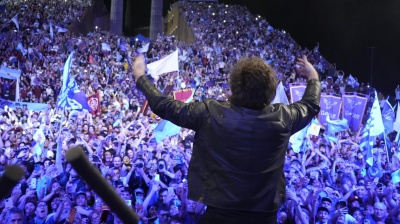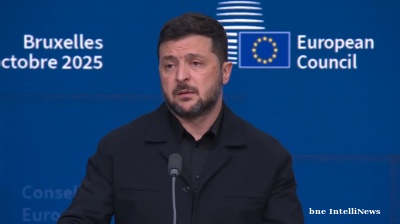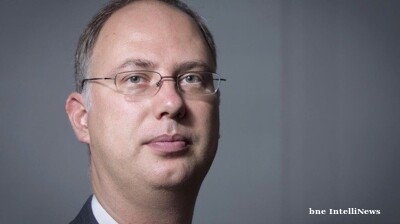During this year, a series of narratives that have emerged in Russia since 2014 must somehow be resolved before the 2018 presidential elections, in which Vladimir Putin is expected to seek and comfortably secure a fourth term.
Next year also sees Russia controversially host the 2018 World Cup, which will require the country to loosen its stringent visa rules so foreign fans can attend games. However, Moscow remains highly sensitive about its border security amid terrorism fears and new tensions with the West. And the price of the tournament preparations, including new stadiums in several cities, just grew another €300mn – bringing the combined spending to an expected RUB639, or €10bn – while most of the population struggles to make ends meet.
In broad brushstrokes, the story so far has been about Russia's international ostracism for its incursions into Ukraine, and recession because of low oil prices and Western sanctions. This year a slow economic recovery will take hold, and Donald Trump's US election victory enhances prospects for Russia's rehabilitation through tackling mutual concerns such as trade and terrorism.
But Russia seldom fits into a neat narrative. The hailed recovery is proving shaky and recent events in Syria showed that Moscow is unlikely to pull its punches in future as it enjoys its reasserted presence on the world stage.
Russia last year demonstrated "stunning hubris and hostility as it interfered in the political processes of the United States and other democracies, escalated its military support for the Assad dictatorship in Syria, and solidified its illegal occupation of Ukrainian territory", Freedom House said in its recently published Freedom in the World 2017 report.
It is against this messy backdrop that the country's less talked about but growing poverty problem also starts to hinder the path towards what Putin on February 8 described as its "inevitable great, beautiful future". (Perhaps he saw the PricewaterhouseCoopers report released a day earlier forecasting that Russia will be the biggest economy in Europe by 2050.)
The plight of Russia's poor was highlighted in mid-2015 by Deputy Prime Minister Olga Golodets, who said about 22mn of the population of 146mn (15%) were living below the poverty line. Last November, the World Bank (WB) warned that half of Russia’s population is at risk of falling into poverty, while the disparity of wealth in the country now exceeds that in the US and China, according to the annual 2016 Global Wealth Report by Credit Suisse published the same month.
One tenth of the richest Russians control 89% of all aggregate wealth, and this figure is climbing. At the same time, about 70% of the adult population in Russia finds itself among the least wealthy half of the global population. The number of Russians considered “vulnerable” to poverty, with incomes totalling less than $10 a day, also jumped to 51% in the first half of last year, according to the WB.
You hang on in there
Tackling hardship with a dark brand of stoicism (and a shot of vodka) is a very Russian thing. Russians hunker down in a crisis until things get better, and typically meet coercion with defiance. So when things got rough as the screws were turned on Russia in 2014, the more Putin rebutted the West, the higher his rating grew at home, even if his team were taking flak.
"There's no money ... You hang on in there," Prime Minister Dmitry Medvedev famously told an irate pensioner in Crimea last May when pressed about the plight of the elderly struggling to live on $120 a month.
Much now depends on the oil price, which while currently bobbing around $55 a barrel may fail to fulfil expectations of clearing $60 this year, and according to some experts, may exhibit a sharp "dead cat bounce" back down after the surge on November's Opec production cut deal. Still, with Russia's budget revenues calculated at $40, the "we're broke" plea won't wash for much longer for Russians counting the kopeks.
And while people like their country's renewed international clout, it comes at a high cost: Defence spending is believed to account for RUB2.84tn (€44bn), or 17.5% of the total budget, while other miscellaneous spending takes the overall state security bill closer to 30%. There are no plans to cut defence spending, Medvedev said in January.
The indexing of pensions was halted in 2016 but reinstated at the start of 2017 as the fiscal pressure on the government eased slightly on the oil gains and some shifty privatisation deals such as Rosneft that bolstered the budget. The government is now looking to gradually replenish its depleted reserves as revenues begin to flow again, but some generous social spending usually precedes elections. To its great credit, the central bank has tackled one of the population's biggest fears, rampant inflation, bringing it below 5%, its lowest level in a decade. But the financial insecurity of the population is still uncomfortably clear.
Consumption remains weak, with retail trade declining 5.9% year-on-year in December despite 7.9% y/y growth in nominal salaries, as well as better-than-expected figures for unemployment, which dropped to 5.3% in December. "This confirms our explanation that an increase in poverty is causing a divergence between relatively positive income and unemployment figures and consumption patterns," Alfa Bank's chief economist Natalya Orlova wrote on January 25.
In a poll conducted in October–December 2016 by marketing research company Nielsen, just over a quarter (27%) of respondents said their financial situation was "good" or "excellent" versus two thirds (67%) who saw it as "bad". The number of Russians who think the economic crisis will end this year plunged to the two-year minimum of 8%, while 85% of respondents believe that the economy is still in crisis.
The only sector doing well in January was food retail, which Alfa again took to be a sign of growing poverty as people eschewed all other non-essential purchases.
None of this is likely to prevent Putin winning a fourth term if he runs (which he will, almost certainly), with no serious challengers for the presidency in sight. The World Cup also offers the Russian leadership a chance to lord it globally once again as in the (albeit later flawed by doping scandals) Sochi Winter Olympics in 2014, days before the lid blew off the Ukraine crisis.
News
Category 5 hurricane Melissa bears down on Jamaica with Haiti and Cuba in storm's path
A catastrophic Category 5 hurricane was bearing down on Jamaica on Monday, October 27 afternoon with sustained winds of up to 282kph (175mph), threatening to become the strongest storm the Caribbean island has ever experienced.
.jpg)
US senator tells Maduro "head to Russia or China" as warships close in on Venezuela
A senior US Republican senator has warned that Venezuelan President Nicolás Maduro's time in power is running out and suggested he leave the country, as military tensions in the Caribbean continue to escalate.

Milei celebrates resounding victory in Argentina's midterm elections
Argentine President Javier Milei scored a major win for his La Libertad Avanza (LLA) party in Argentina's October 26 midterm legislative elections, as the party obtained approximately 40.84% of the nationwide vote with 99.14% of the votes counted.

Zelenskiy accuses China of aiding Russia’s war effort through industrial and military support
Ukrainian President Volodymyr Zelenskiy accused China of materially supporting Russia’s military-industrial complex, providing key technologies and resources that have enabled Moscow to sustain and scale its war effort against Ukraine.


